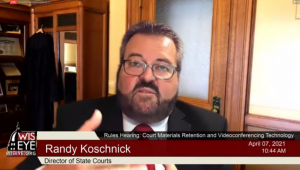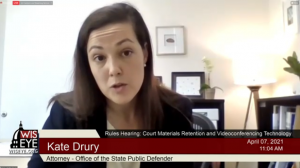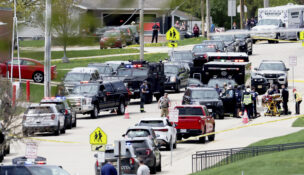Proposed videoconferencing rule petition raises concerns about defendants’ rights
By: Michaela Paukner, [email protected]//April 8, 2021//
Proposed videoconferencing rule petition raises concerns about defendants’ rights
By: Michaela Paukner, [email protected]//April 8, 2021//
A rules petition meant to expand Wisconsin courts’ ability to use videoconferencing has some criminal-defense attorneys concerned about infringement on defendants’ constitutional rights.
The Wisconsin Supreme Court held a public hearing on Rule Petition 20-09 on Wednesday. The petition proposes several revisions to Supreme Court Rules 885.60-64 and various state statutes in response to changes in technology, and clarify the authority of the court and chief judge to use technology and choose the location of the court.
The petition proposes repealing 885.60(2)(d), which states ” If an objection is made by the defendant or respondent in a matter listed in sub. (1), regarding any proceeding where he or she is entitled to be physically present in the courtroom, the court shall sustain the objection.”

Judge Randy Koschnick, director of state courts, said the statute essentially gives a defendant an absolute veto power for videoconferencing. He cited cases and courts in the past that have allowed witnesses to appear via video, including those involving child victims of sexual assault, which he said wouldn’t be allowed if a defendant objected.
“I think all you need is one legal hypothetical to demonstrate that 2(d) gives too much power to the defendant, and it gives the defendant the power to overrule the circuit-court judge,” Koschnick said.
Justice Ann Walsh Bradley voiced concerns about repealing the statute and the lack of limitations it includes.
“I find it a bit unnerving that we would have this in front of us in a rule petition,” Bradley said.
Koschnick said the decision was purely structural to allow a judge to exercise discretion.
“I’m not trying to expand or contract anyone’s constitutional rights,” he said.
Kate Drury, a state public defender, disagreed, arguing that the petition eliminates defendants’ rights to opt out of videoconferencing. The public defender’s office filed a response to the petition that took issue with that and other parts of the proposal.

She said that although most defendants will agree to using videoconferencing for critical proceedings, the office’s objection centers around the small number of clients who don’t consent to do so.
“Efficiency is an admirable goal until it negatively impacts the litigants who have a liberty interest at stake,” Drury said.
Sarah M. Schmeiser, vice president of the Wisconsin Association of Criminal Defense Attorneys, and several other defense attorneys also spoke out against the proposal. Many said they were in favor of expanding technology in the courts, but concerned about the petition’s impact on defendants’ constitutional rights.
“Having a defendant simply sitting in a room with a judge is not sufficient to protect a defendant’s rights,” Schmeiser said.
The petition is the result of a task force convened by Koschnick in June. The group — which included judges, a public defender, an assistant district attorney, a circuit-court clerk and more — explored possible statutory and administrative-rule changes to allow for remote hearings to continue after the pandemic.
The court met in closed conference later in the day to discuss. Comments filed in support of and against the petition are available on the state Supreme Court’s website. A recording of the public hearing is available via WisconsinEye. Follow @WLJReporter
Legal News
- (Updated) Wisconsin law enforcement clash with pro-Palestinian Madison protestors
- Gov. Evers seeks applicants for Lafayette County Circuit Court
- Complaint against University filed by Wisconsin law firm over $1.9M given to Palestinian students
- Hush money trial judge raises threat of jail as he finds Trump violated gag order, fines him $9K
- Active shooter ‘neutralized’ outside Wisconsin middle school
- Audit finds Wisconsin Capitol Police emergency response times up, calls for better tracking
- Jury finds Wisconsin man sane in sexual assault, killing of toddler
- Attorney sentenced to 20 years in prison for sexually exploiting numerous children
- UW-Madison pro-Palestine protesters spark debate over free speech laws
- DEA to reclassify marijuana in a historic shift
- Wisconsin opens public comment on constitutional amendment regarding election officials
- Court upholds Milwaukee police officer’s firing for posting racist memes
WLJ People
- Power 30 Personal Injury Attorneys – Russell Nicolet
- Power 30 Personal Injury Attorneys – Benjamin Nicolet
- Power 30 Personal Injury Attorneys – Dustin T. Woehl
- Power 30 Personal Injury Attorneys – Katherine Metzger
- Power 30 Personal Injury Attorneys – Joseph Ryan
- Power 30 Personal Injury Attorneys – James M. Ryan
- Power 30 Personal Injury Attorneys – Dana Wachs
- Power 30 Personal Injury Attorneys – Mark L. Thomsen
- Power 30 Personal Injury Attorneys – Matthew Lein
- Power 30 Personal Injury Attorneys – Jeffrey A. Pitman
- Power 30 Personal Injury Attorneys – William Pemberton
- Power 30 Personal Injury Attorneys – Howard S. Sicula











